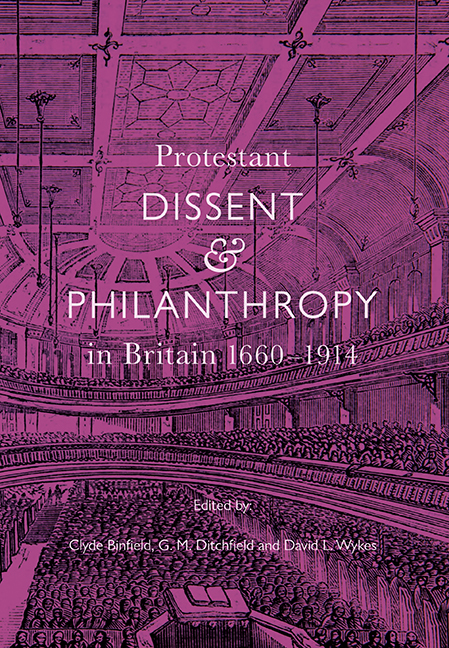Book contents
- Frontmatter
- Dedidcation
- Contents
- List of Illustrations and Tables
- List of Contributors
- Acknowledgements
- List of Abbreviations
- Introduction
- 1 Dissent and Charity, 1660–1720
- 2 Dissenters and Charity Sermons, c. 1700 to 1750
- 3 John Howard, Dissent and the Early Years of Philanthropy in Britain
- 4 Rational Philanthropy: Theory and Practice in the Emergence of British Unitarianism, c. 1750–1820
- 5 David Nasmith (1799–1839), Philanthropy Expressed as Campaigning
- 6 Building Philanthropy: The Example of Joshua Wilson (1795–1874)
- 7 Funding Faith: Early Victorian Wesleyan Philanthropy
- 8 Unitarians and Philanthropy After 1844: the Formation of a Denominational Identity
- 9 Children and Orphans: Some Nonconformist Responses to the Vulnerable in Victorian Britain
- 10 The Rowntree Family and the Evolution of Quaker Philanthropy, c. 1880 to c. 1920
- 11 ‘Not slothful in business’: Enriqueta Rylands and the John Rylands Library
- Select Bibliography
- Index
- STUDIES IN MODERN BRITISH RELIGIOUS HISTORY
6 - Building Philanthropy: The Example of Joshua Wilson (1795–1874)
Published online by Cambridge University Press: 21 March 2020
- Frontmatter
- Dedidcation
- Contents
- List of Illustrations and Tables
- List of Contributors
- Acknowledgements
- List of Abbreviations
- Introduction
- 1 Dissent and Charity, 1660–1720
- 2 Dissenters and Charity Sermons, c. 1700 to 1750
- 3 John Howard, Dissent and the Early Years of Philanthropy in Britain
- 4 Rational Philanthropy: Theory and Practice in the Emergence of British Unitarianism, c. 1750–1820
- 5 David Nasmith (1799–1839), Philanthropy Expressed as Campaigning
- 6 Building Philanthropy: The Example of Joshua Wilson (1795–1874)
- 7 Funding Faith: Early Victorian Wesleyan Philanthropy
- 8 Unitarians and Philanthropy After 1844: the Formation of a Denominational Identity
- 9 Children and Orphans: Some Nonconformist Responses to the Vulnerable in Victorian Britain
- 10 The Rowntree Family and the Evolution of Quaker Philanthropy, c. 1880 to c. 1920
- 11 ‘Not slothful in business’: Enriqueta Rylands and the John Rylands Library
- Select Bibliography
- Index
- STUDIES IN MODERN BRITISH RELIGIOUS HISTORY
Summary
Introduction
Joshua Wilson looked the part, handsome, a full head of white hair, clean-shaven, broad-browed, his unlined face perhaps on the plump side – but was what you saw what you got? Here was one of Congregationalism's indispensable stringpullers. He was the layman behind the Congregational bicentenary celebrations in 1862. An instinctive but experienced strategist, he played a critical part, barely perceptible save to those who were in a position to know, in shaping Congregationalism into a denomination fit for Victorian purpose. Its traditions, its literature, its public role, its national Union and that Union's agencies, the deployment of its ministers, the well-being of its congregations, and the usefulness of the buildings in which pastors and people lived, learned, worked and worshipped, concerned him greatly. They came together in his orderly mind. He belonged to one of Congregationalism's most public families but he was the least public of men. It was a suggestive combination and philanthropy was part of it. In his daughter's words, ‘there were few great philanthropic movements of his own time which did not feel the influences of his generous spirit. Praying and giving were his two most marked characteristics. He brought the whole world to God in daily prayer’ and he gave away at least one-third of his annual income. Wilson inherited and refined a formidable family tradition of upwardly mobile evangelicalism. The manufacture of silk made these Wilsons rich and George Whitefield's revival shaped their faith across many branches. Samuel Wilson (1792–1881) was Lord Mayor of London in 1838. His family moved out to The Cedars, Beckenham. Samuel's uncle, William Wilson, moved further out, to Oxfordshire. His family were squires of Over with Nether Worton and patrons of its living. They nurtured evangelicalism in their part of Oxfordshire; a young Oriel evangelical, John Henry Newman, preached his first sermon at Over Worton in 1824. The best known of these Wilsons, cousins of the Beckenham Wilsons and cousins and in-laws of the Worton Wilsons, were the Daniel Wilsons, father and son. Daniel Wilson (1778–1858), minister of St John’s, Bedford Row, vicar of Islington, and bishop of Calcutta; and Daniel Wilson (1807–86), rector of Over Worton, vicar of Islington and prebendary of St Paul’s, were evangelical apologists and strategists. The name, Daniel Wilson, was to the forefront of London's evangelical life from the first to the ninth decades of the nineteenth century.
- Type
- Chapter
- Information
- Protestant Dissent and Philanthropy in Britain, 1660–1914 , pp. 113 - 128Publisher: Boydell & BrewerPrint publication year: 2020

